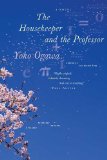Book Club Discussion Questions
In a book club? Subscribe to our Book Club Newsletter and get our best book club books of 2025!
For supplemental discussion material see our Beyond the Book article, and our BookBrowse Review of The Housekeeper and the Professor.
Please be aware that this discussion guide will contain spoilers!
About This Book
In
The Housekeeper and the Professor, Yoko Ogawa tells an intimate story
about family, the nature of memory, and the poetry of mathematics. It is also,
in a sense, a story about the simple experience of getting to know someone, but
with a twist: the person forgets everything in eighty minutes. How do you form a
relationship with a person who cannot remember? In this uplifting and often
poignant novel, Ogawa seems to ask whether our immediate experiences are more
important than our memories, since memories inevitably fade, and the eponymous
Professor's condition of limited short-term memory allows the author to explore
this question with great creativity. At the same time, Ogawa invites the reader
into the world of mathematics, using complex equations as a metaphor for the
themes running throughout her book.
The Housekeeper and the Professor is
a rich, multilayered novel that offers much to discuss.
Discussion Questions
- The characters in The Housekeeper and the Professor are nameless
("Root" is only a nickname). What does it mean when an author chooses not to
name the people in her book? How does that change your relationship to them
as a reader? Are names that important?
- Imagine you are writer, developing a character with only eighty minutes
of short-term memory. How would you manage the very specific terms of that
character (e.g. his job, his friendships, how he takes care of himself)?
Discuss some of the creative ways in which Yoko Ogawa imagines her
memory-impaired Professor, from the notes pinned to his suit to the sadness
he feels every morning.
- As Root and the Housekeeper grow and move forward in their lives, the
Professor stays in one place (in fact he is deteriorating, moving
backwards). And yet, the bond among the three of them grows strong. How is
it possible for this seemingly one-sided relationship to thrive? What does
Ogawa seem to be saying about memory and the very foundations of our
profoundest relationships?
- The Professor tells the Housekeeper: "Math has proven the existence of
God because it is absolute and without contradiction; but the devil must
exist as well, because we cannot prove it." Does this paradox apply to
anything else, beside math? Perhaps memory? Love?
- The Houskeeper's father abandoned her mother before she was born; and
then the Housekeeper herself suffered the same fate when pregnant with Root.
In a book where all of the families are broken (including the Professor's),
what do you think Ogawa is saying about how families are composed? Do we
all, in fact, have a fundamental desire to be a part of a family? Does it
matter whom it's made of?
- Did your opinion of the Professor change when you realized the nature of
his relationship with his sister-in-law? Did you detect any romantic tension
between the Professor and the Housekeeper, or was their relationship chaste?
Perhaps Ogawa was intending ambiguity in that regard?
- The sum of all numbers between one and ten is not difficult to figure
out, but the Professor insists that Root find the answer in a particular
way. Ultimately Root and the Housekeeper come to the answer together. Is
there a thematic importance to their method of solving the problem?
Generally, how does Ogawa use math to illustrate a whole worldview?
- Baseball is a game full of statistics, and therefore numbers. Discuss
the very different ways in which Root and the Professor love the game.
- How does Ogawa depict the culture of contemporary Japan in The
Housekeeper and the Professor? In what ways does is it seem different
from western culture? For example, consider the Housekeeper's pregnancy and
her attitude toward single motherhood; or perhaps look at the simple details
of the story, like Root's birthday cake. In what ways are the cultures
similar, different?
- Ogawa chooses to write about actual math problems, rather than to write
about math in the abstract. In a sense, she invites the reader to learn math
along with the characters. Why do you think she wrote the book this
way? Perhaps to heighten your sympathy for the characters?
- Do numbers bear any significance on the structure of this book? Consider
the fact that the book has eleven chapters. Are all things quantifiable, and
all numbers fraught with poetic possibility?
For more information on Picador Reading Group Guides:
Call: 646-307-5259
Fax: 212-253-9627
E-mail: readinggroupguides@picadorusa.com
For a complete listing of reading group guides visit:
www.picadorusa.com
What to Read Next®
Unless otherwise stated, this discussion guide is reprinted with the permission of Picador.
Any page references refer to a USA edition of the book, usually the trade paperback version, and may vary in other editions.
